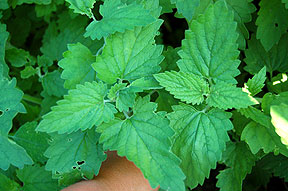Catnip
- Catnip is a plant. The flowering tops are used to make medicine.
Contents
Uses
- Trouble sleeping (insomnia)
- Anxiety
- Migraine and other headaches
- Cold and other upper respiratory infections
- Flu
- Fever
- Hives
- Worms
- Gastrointestinal (GI) upset, including indigestion, colic, cramping, and gas (flatulence)
- It is also used as a tonic, for increasing urination, and for starting menstrual periods in girls with delayed onset of menstruation.
- Some people apply catnip directly to the skin for arthritis, hemorrhoids, and as a compress to relieve swelling.
- Some people also smoke catnip medicinally for respiratory conditions and recreationally for a “high.”
- In manufacturing, catnip is used as a pesticide and insecticide.
Benefits
- It is thought that the chemicals in catnip have a calming effect.
Cautions
- Catnip is POSSIBLY SAFE for most adults when taken by mouth in small amounts. Cupful amounts of catnip tea have been consumed without serious side effects. However, catnip is POSSIBLY UNSAFE when smoked or taken by mouth in high doses (many cups of catnip tea, for example).
- It can cause headaches, vomiting, and a feeling of being ill.
- Not enough is known about the safety of applying catnip directly to the skin.
- Children: Catnip is POSSIBLY UNSAFE for children when taken by mouth. There has been one report of a child experiencing stomach pain, irritability, and sluggishness after taking catnip leaves and tea.
- Pregnancy and breast-feeding: It is LIKELY UNSAFE to use take catnip during pregnancy. There is some evidence that catnip can stimulate the uterus. This might cause a miscarriage.
- There is not enough reliable information about the safety of taking catnip if you are breast-feeding. Stay on the safe side, and avoid use.
- Pelvic inflammatory disease (PID): Women with PID should avoid using catnip because it can start menstruation.
- Heavy menstrual periods (menorrhagia): Because catnip can cause menstruation, it might make heavy menstrual periods worse.
- Surgery: Catnip seems to be able to slow down the central nervous system (CNS), causing sleepiness and other effects. Anesthesia and some other drugs used during and after surgery also slow down the CNS. There is a concern that using catnip along with these drugs might slow down the CNS too much. Stop using catnip at least two weeks before a scheduled surgery.
Interactions
Moderate Interaction Be cautious with this combination
- Lithium interacts with CATNIP: Catnip might have an effect like a water pill or “diuretic.” Taking catnip might decrease how well the body gets rid of lithium. This could increase how much lithium is in the body and result in serious side effects. Talk with your healthcare provider before using this product if you are taking lithium. Your lithium dose might need to be changed.
- Sedative medications (CNS depressants) interacts with CATNIP: Catnip might cause sleepiness and drowsiness. Medications that cause sleepiness are called sedatives. Taking catnip along with sedative medications might cause too much sleepiness.
Some sedative medications include clonazepam (Klonopin), lorazepam (Ativan), phenobarbital (Donnatal), zolpidem (Ambien), and others.
Other Names
Cataire, Catmint, Catnep, Catswort, Chataire, Field Balm, Herbe à Chat, Herbe aux Chats, Hierba Gatera, Menta de Gato, Menthe des Chats, Nepeta cataria.
References
Source: WebMD, “Catnip”, www.webmd.com/vitamins-supplements/

